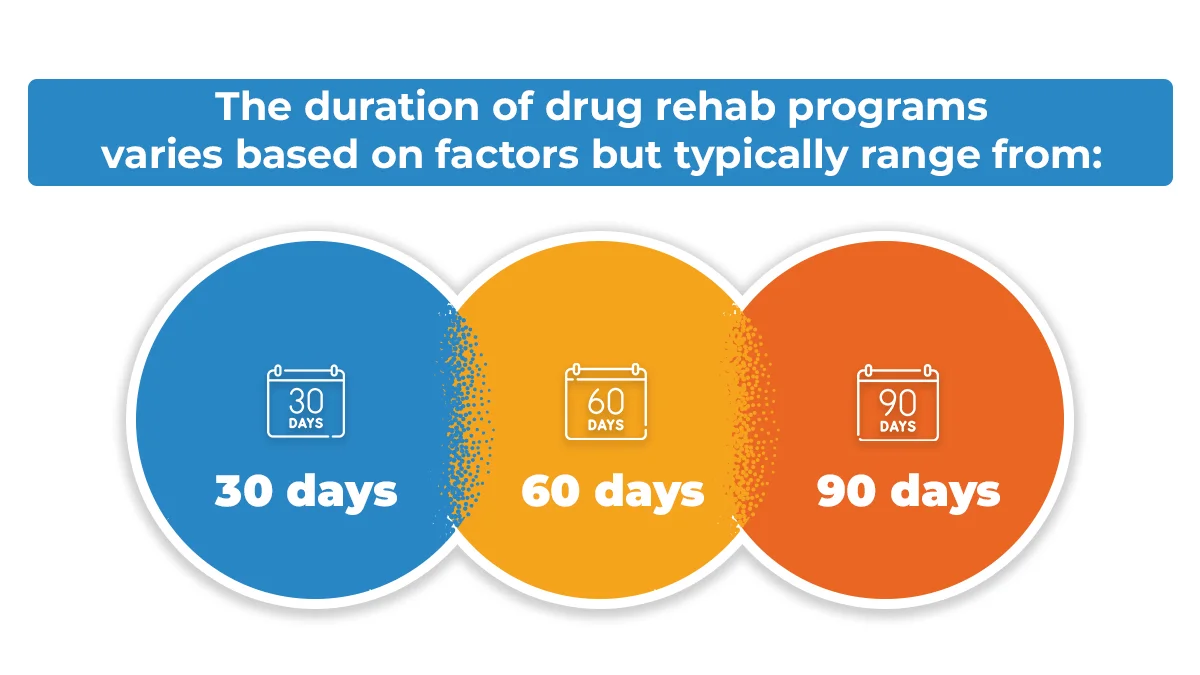
Examples Of Dual Diagnosis
Explore the examples of dual diagnosis and its treatment plans for better outcomes with The Recovery Team-Newton.

Drug addiction is a complex condition that affects millions of people worldwide. It’s characterized by compulsive drug seeking and use despite harmful consequences. However, there’s hope for recovery through addiction treatment programs such as drug rehabilitation.
Drug rehab programs are like a toolbox filled with different tools to help someone overcome addiction. Explore the various types and lengths of drug rehab programs in our complete guide.
Our comprehensive drug rehab programs are designed to provide the support, guidance, and resources necessary for individuals to reclaim their lives from addiction. Here’s what you should know:
The Recovery Team-Newton helps you overcome addiction by providing different levels of care and treatment. Call us at (508) 978-2772 for details.
Drug rehabilitation, commonly known as drug rehab, is a structured process aimed at helping individuals overcome substance abuse and addiction. It involves a combination of medical, psychological, and social interventions to address the physical, mental, and emotional aspects of addiction. Drug rehab programs assist individuals in breaking free from the cycle of dependency and reclaiming control over their lives.
The purpose of drug rehab programs is multifaceted. They provide support, therapy, and skills to overcome addiction, promoting individual recovery and reducing societal burdens of substance use. The significance of drug rehab cannot be overstated. It not only helps individuals overcome addiction but also reduces the societal burden of substance abuse, including unemployment and healthcare costs.
Drug rehabilitation programs offer a vital pathway to recovery for individuals struggling with addiction. These programs enable individuals to regain control over their lives and achieve long-term sobriety. The purpose and significance of drug rehab extend beyond individual recovery. They impact communities and society as a whole by reducing the harmful effects of substance use disorders.
Drug rehab programs offer various avenues for individuals struggling with substance abuse to seek help and recovery. These types of programs cater to different needs and levels of drug or alcohol addiction. Each type serves a unique purpose in the journey toward recovery. The following are among the most common types, each designed to address specific aspects of addiction recovery.
Drug detox programs are aimed at helping individuals safely and comfortably withdraw from substances. They provide medical supervision and support to manage withdrawal symptoms and minimize complications. Detoxification may occur in an inpatient or outpatient setting, depending on the severity of the addiction and the individual’s needs. It is the first step in the recovery process, preparing individuals for further treatment and addressing the physical aspect of addiction.
Inpatient treatment programs require individuals to reside in a treatment facility temporarily. They offer intensive inpatient care and supervision, including behavioral therapy sessions and medical aid. These programs provide a structured environment and place helpful to recovery, offering 24-hour care and support from medical professionals. Inpatient rehab programs are particularly beneficial for individuals requiring a higher level of medical care due to severe addiction or co-occurring mental health issues.
Outpatient programs allow individuals to receive treatment while continuing their daily lives. Patients attend therapy sessions, counseling, and other treatment activities on a scheduled basis, usually several times a week. This flexibility enables individuals to maintain work, school, or family commitments while seeking recovery support. Outpatient treatment programs are suitable for those with milder drug addiction who have a strong support system and stable living environment.
A residential treatment program involves living in a specialized rehab facility for longer periods, typically from a few weeks to several months. It offers a supportive environment where individuals can focus solely on their recovery. These programs often include therapy, counseling, skill-building activities, and holistic approaches to healing. Residential programs provide a haven for people to address underlying issues and develop coping mechanisms for long-term sobriety.
The duration of drug rehab programs varies based on factors like addiction severity, type of substance, and co-occurring mental health conditions such as anxiety, depression, bipolar disorder, etc. Longer programs often cater to severe cases of addictions or dual diagnoses. Conversely, shorter programs may suit milder cases or single-substance addictions. Overall, rehab length ranges from weeks to several months, aiming to provide broad recovery support.
30-day programs offer intensive treatment plans for individuals struggling with alcohol use disorder. Patients undergo therapy, counseling, and medical supervision for 30 days to address addiction issues. This program aims to provide a structured recovery environment, teach coping mechanisms, and foster sobriety. It’s a short-term but focused approach to help people kick-start their journey toward a drug-free and productive life.
60-day programs extend treatment duration to two months, allowing for a deeper exploration of addiction triggers and patterns. Patients receive comprehensive care, including individual and group therapy sessions, detoxification, and aftercare planning. This extended amount of time enhances the likelihood of sustained recovery by addressing root causes contributing to drug abuse. It provides sufficient time for patients to develop essential skills for maintaining sobriety.
90-day programs offer the most extended duration of treatment, lasting three months or more. This timeframe allows for thorough detoxification, intensive therapy, and gradual reintegration into society. Patients receive continuous support and monitoring to prevent relapse and build a solid foundation for long-term sobriety. These programs prioritize holistic healing, addressing physical, mental, and emotional aspects of addiction for lasting recovery and improved overall well-being.
Choosing the right length for your rehab program is crucial as it directly impacts your recovery. Individual needs vary, so treatment options should align with specific requirements. While some clients may benefit from a longer stay in residential facilities or therapeutic communities, others may find better outcomes with shorter stays and more intensive programs.
Consideration of physical health, medical history, and any specific needs is essential in determining the appropriate length of treatment. Longer stays often provide ongoing support and a more comprehensive treatment process, while shorter programs may focus on specific concerns or issues. Health insurance coverage may influence the length of treatment available to clients.
Additionally, aftercare programs and follow-up treatment should be considered to ensure a successful transition into daily life. Formal treatment combined with ongoing support in a sober living environment can enhance recovery outcomes and provide a better fit for long-term sobriety. It’s essential to assess the effectiveness of different addiction treatment programs and their suitability for individual needs.
Tailoring the length of treatment to meet specific needs can lead to positive outcomes and a higher likelihood of sustained recovery. Regardless of the chosen duration, ongoing support and access to aftercare programs are critical for maintaining sobriety and addressing any challenges that may arise post-rehabilitation. By considering various factors and exploring available options, individuals can choose a rehab program length that best supports their journey toward recovery.
Having fun without drinking is possible and can lead to more fulfilling experiences. While it might seem like drunk people are having the most fun, the reality is that the most challenging part is often dealing with the consequences of excessive drinking.
There are many ways to have fun without alcohol, such as trying new activities, exploring hobbies, or attending sober events. Surrounding yourself with sober friends or seeking support groups can make the transition easier. Remember, every occasion can be enjoyable without alcohol if you focus on the company and the moment.
You can replace drinking alcohol with various activities that are equally enjoyable and healthier. Instead of hitting the bar, hit the dance floor at a club or attend dance classes. Use your free time to explore hobbies like painting, hiking, or cooking.
Opting for non-alcoholic drinks like mocktails or refreshing juices can be the best way to stay hydrated and sober. During summer, indulge in outdoor activities like swimming or picnics. The best ways to avoid a hangover the next day are by staying hydrated, getting enough sleep, and engaging in alcohol-free fun.
There are plenty of fun things to do without alcohol! You could have a movie night with friends, go bowling, or have a picnic in the park. How about trying out a new sport like soccer or basketball? You could also get creative with arts and crafts or volunteer at a local charity.
Board game nights and karaoke parties are always a blast, too! The key is to find activities that you and your friends enjoy and that don’t involve alcohol.
Are you or a loved one struggling with addiction and searching for the right rehab program? The Recovery Team-Newton is here to help you navigate this journey towards recovery.
Our treatment center offers a day treatment program to help you overcome addiction. Our program is designed to provide different levels of care to patients through medication-assisted treatment, evidence-based therapies, and holistic approaches, depending on the severity of care required for each client.
We also offer comprehensive and individual dual diagnosis treatment for patients who suffer from drug and alcohol addiction, mental health disorders, and co-occurring disorders.
Don’t let addiction hold you back any longer. Call us at (508) 978-2772 to explore personalized drug rehab programs tailored to your needs.
Having fun without drinking is possible and can lead to more fulfilling experiences. While it might seem like drunk people are having the most fun, the reality is that the most challenging part is often dealing with the consequences of excessive drinking.
There are many ways to have fun without alcohol, such as trying new activities, exploring hobbies, or attending sober events. Surrounding yourself with sober friends or seeking support groups can make the transition easier. Remember, every occasion can be enjoyable without alcohol if you focus on the company and the moment.
You can replace drinking alcohol with various activities that are equally enjoyable and healthier. Instead of hitting the bar, hit the dance floor at a club or attend dance classes. Use your free time to explore hobbies like painting, hiking, or cooking.
Opting for non-alcoholic drinks like mocktails or refreshing juices can be the best way to stay hydrated and sober. During summer, indulge in outdoor activities like swimming or picnics. The best ways to avoid a hangover the next day are by staying hydrated, getting enough sleep, and engaging in alcohol-free fun.
There are plenty of fun things to do without alcohol! You could have a movie night with friends, go bowling, or have a picnic in the park. How about trying out a new sport like soccer or basketball? You could also get creative with arts and crafts or volunteer at a local charity.
Board game nights and karaoke parties are always a blast, too! The key is to find activities that you and your friends enjoy and that don’t involve alcohol.

Explore the examples of dual diagnosis and its treatment plans for better outcomes with The Recovery Team-Newton.

How much does drug rehab cost without insurance? The Recovery Team-Newton explains financing options and resources.

Learn how to have fun without alcohol with the tips from The Recovery Team-Newton.